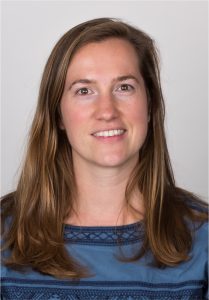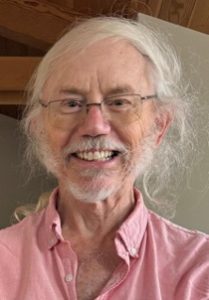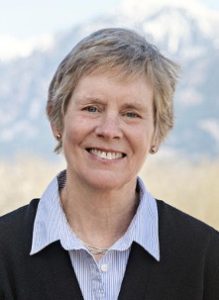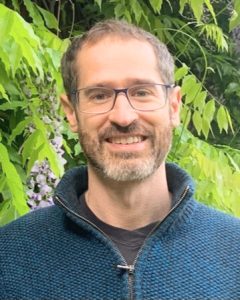Eric Steig among 12 UW professors elected to Washington State Academy of Sciences
How hot can Earth get? Our planet’s climate history holds clues
Stay calm. The ‘earthquake swarm’ at Mount Rainier is normal
Mysterious link between Earth’s magnetism and oxygen levels baffles scientists
ESS introduces new alumni honors at the 2025 Awards Ceremony
This year, we are excited to introduce two new awards that acknowledge some of our excellent graduates: the Emerging Leader Award and the ESS Distinguished Graduate Award. We were pleased that all four awardees were able to join the Ceremony. By honoring our former students, we hope to inspire today’s students to strive for both personal and professional success.
ESS Emerging Leader Award
The ESS Emerging Leader Award recognizes an ESS graduate who has earned their highest degree within the last 10 years, and is a role model for current and future professionals through leadership, innovation and dedication in their field of practice. This award highlights the positive impact ESS graduates make on their local community, country, and the world early in their career. An awardee is expected to exemplify the vision and values of the UW in fostering the next generation of global citizens and future leaders.

Dr. Annie Bauer, a Pacific Northwest native from Shoreline, a double major in French and Italian Studies, distinguished herself as an ESS undergraduate through research in both John Stone’s and Bruce Nelson’s labs and as a leader in several roles. She graduated with honors and was a recipient of a Barksdale award, a Mary Gates Research Scholarship, and the Merrill Prize–the department’s highest undergraduate award. Annie completed her Ph.D. at MIT with Sam Bowring, focusing on Archean crust and atmospheric evolution, including pioneering work on ancient oxygen signals in South African sediments. Following a Simons Postdoctoral Fellowship at Yale, she joined the University of Wisconsin as an Assistant Professor, where she leads the Earth Evolution research group and the ICP-TIMS lab. Nationally recognized for her mentorship and scientific leadership, she received the Geological Society of America’s Doris M. Curtis Outstanding Woman in Science Award in 2022.
In reflecting on her time at UW, Annie wrote:
I think often of how fortunate I was to come across the array of ESS classes as an undergraduate, and how good it felt to become part of this community. The exceptional research mentorship and instruction from faculty, staff, and graduate students at UW gave me momentum into graduate school and continue to serve as my keystone reference for how I want to conduct myself as a researcher, mentor, and instructor.
ESS Distinguished Graduate Award
The ESS Distinguished Graduate Award is a lifetime achievement award recognizing truly outstanding individuals who have had an inspirational impact and who have made significant contributions to their profession and their community. Criteria for the award include scientific achievements, leadership and service, impact on education and outreach, recognition and influence, and engagement with the UW, College and ESS communities. ESS has fostered many distinguished graduates, from whom this year we recognized three individuals.
Our three Distinguished Grads were able to meet with ESS and QRC graduate students for a mentoring lunch before the awards ceremony, and we were fortunate that our Emerging Leader was able to be the speaker at ‘PetroLunch’, a weekly lunch-time seminar attended by faculty, postdocs, graduate students and undergrads.

Dr. A. Wesley (Wes) Ward began his scientific journey in Illinois with a passion for planetary exploration, earning his degree from Washington State University in 1973 after military service. He completed his M.S. and Ph.D. in ESS, studying Columbia River basalt petrology and Martian eolian geomorphology. Following postdoctoral work at Arizona State University, Wes joined the U.S. Geological Survey’s Astrogeology group, where he led pioneering research on terrestrial and Martian eolian features. His life-long career at the USGS included a number of catalyzing leadership positions including Chief Scientist of the Astrogeology Program and Regional Executive for the Southwest Region. For decades, Wes has also been a tireless leader in mentorship and service to both professional and community organizations, large and small. An active member and past president of the National Association for Black Geoscientists, he also led the USGS Minority Participation programs in the Southwest. Wes’s contributions to the Geological Society of America have included important work for the GSA Foundation and several roles promoting diversity in the geosciences. His recent work includes co-editing a volume of autobiographical essays by underrepresented geoscientists, including his own inspiring story.
In learning of his Distinguished Graduate award, Wes wrote:
It seems so far beyond what I might have imagined in the summer of 1973, as I came to chat with John Whetten and Randy Gresens…. The training that I received at UW and the achievements and contributions I have made are direct reflections of my years there. The USGS has always considered UW one of the best institutions for research and professional preparation, so all that I am in that world is a direct result of what you have given me.

Dr. William (Bill) Dietrich earned his B.A. in geology from Occidental College in 1972 and came to UW the same year, completing diverse research projects for his M.S. and Ph.D. ranging from water resources in the San Juan Islands to soil erosion in Kenya and, for his Ph.D., sediment transport in river meanders at Muddy Creek, Wyoming. His innovative work with settling velocities of natural particles became one of his most cited papers. By the time he completed his Ph.D., Bill had already published 14 papers and joined the faculty at UC Berkeley, where he remains today. In partnership with his wife and scientific collaborator Mary Power, he helped shape the interdisciplinary field of ecogeomorphology. In addition to mentoring many young scientists (including our own Dave Montgomery), Bill has been unselfish in cooperation and collaboration within the geomorphic community. This is best illustrated by his founding of the now-famous “Gilbert Club,” a post-AGU gathering he started in 1983 as a living-room salon, which now attracts hundreds of researchers. Widely regarded as one of the most productive and influential geomorphologists in the world, Bill has revolutionized landscape modeling and prediction through pioneering fieldwork and tools such as airborne lidar.
With regard to his time and education at UW, Bill has written:
“Coming to UW from a small college, I was startled and delighted by the breadth, depth, and enthusiasm of the faculty and graduate students. Tom Dunne arrived in 1973 and introduced me to geomorphology. The QRC seminar series greatly broadened my understanding. For my Ph.D., I spent uncountable hours with Tom Dunne and Jim Smith, who shared their insights; the joy of field work; the necessity of theory; and the deep value of debate, discussion, and collaboration. Everything I have been able to do since follows from my experiences at UW.”

Dr. Cathy Whitlock earned her undergraduate degree at Colorado College and came to UW in 1975 as an NSF graduate research fellow, completing her M.S. and Ph.D. under Estella Leopold with a focus on the Late Quaternary vegetational history of Washington. After a Nato-sponsored Visiting Research Fellow at Trinity College, Dublin, she became curator of paleobotany at the Carnegie Museum and joined the faculty at the University of Pittsburgh. She subsequently spent nearly two decades at the University of Oregon, before moving to Montana State University. From her base in Montana, she has made significant contributions to Yellowstone science and public education. Cathy’s recent TEDx talk, “Past climate change in Yellowstone shed light on our future” is a good introduction to her work and impact. A leader in the field of Quaternary paleoecology, Cathay pioneered the use of fossil pollen and charcoal to trace interactions among fire, vegetation, climate, and people in the Americas. Her influential work on fire as a keystone ecosystem process has shaped both scientific understanding and U.S. public policy in the context of climate change and society.
Learning of her UW Distinguished Graduate Award, Cathy wrote:
“My days in the Department and the Quaternary Research Center were some of the best of my career and cemented my interest in paleoecology. I remember that ideas flowed freely during brown-bag lunch seminars, in the hallways, on field trips, and at social events. Weekly wine and cheese parties at QRC Director Estella Leopold’s house were not-to-be-missed gatherings of faculty, student buddies, conservation leaders, and eminent scholars from around the world.”
ESS Research Scientist Scott Henderson awarded College of the Environment 2025 Distinguished Staff Award

ESS Research Scientist Scott Henderson was recognized this spring with the College of the Environment Distinguished Staff Member award. This award honors staff members for their outstanding achievements, service, leadership and dedication. The Awards Committee was impressed by the many letters from faculty, students and staff in support of Scott’s nomination. Scott exemplifies the qualities of an outstanding staff member: technical excellence, a collaborative spirit and a deep commitment to supporting the academic community.
Scott’s impact on student success is profound. His unwavering dedication to mentorship — whether through hands-on guidance, interdisciplinary collaboration or creating opportunities for growth — has inspired a new generation of geoscientists and data scientists. As one student reflected, “In his time at UW, Scott has mentored many early career folks, as well as graduate students, of which I am proud to be one. His mentorship has both shaped me into a more confident scientist and has also facilitated my acceptance into the broader cryosphere and open-science community.” His leadership in initiatives like the eScience Hackweeks and the Data Science Incubator program has built lasting professional networks for students and early career scientists.
Scott’s technical expertise and vision have transformed data science research and education at UW. One colleague noted that his “impact on open-source computing, education and research is nothing short of transformative.” Another highlighted the scale of his contributions: Scott has made substantial contributions “across hundreds of open-source software packages, significantly improving the tools that underlie modern scientific research. He has selflessly given his time to nurturing both the software packages that enable high-impact research and the communities that support them.” His work not only has advanced the accessibility of cutting-edge computational tools but also has empowered students, faculty and researchers across disciplines to integrate these tools into their research seamlessly.
Scott’s colleagues also emphasized his generosity, collaborative spirit and dedication to cross-disciplinary teamwork. His commitment to open science, contributions to critical research infrastructure and behind-the-scenes support have advanced UW’s mission as well as left an enduring mark on the broader scientific community.
Please join us in congratulating Scott Henderson on this well-deserved recognition of his extraordinary contributions to student success, research excellence and the collaborative spirit of the College of the Environment!